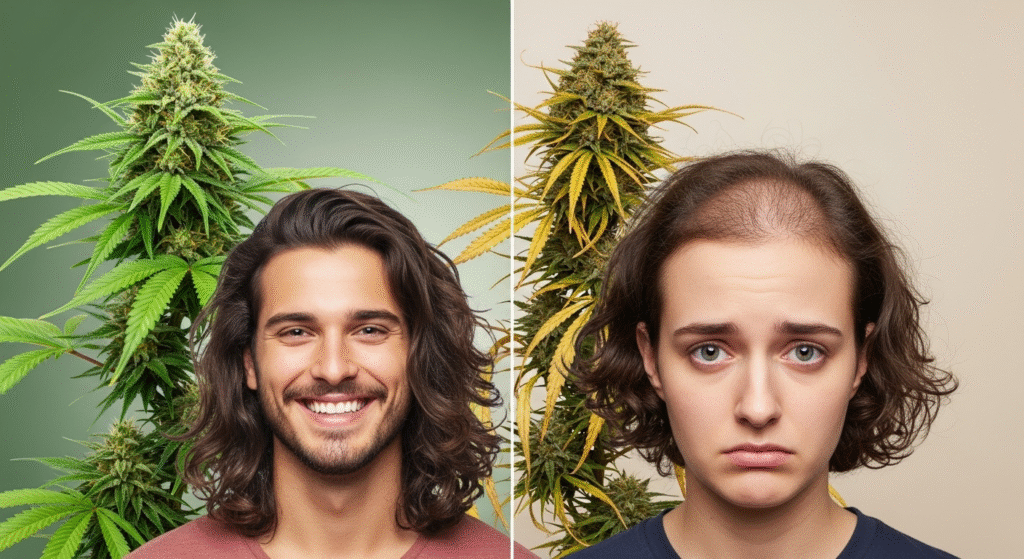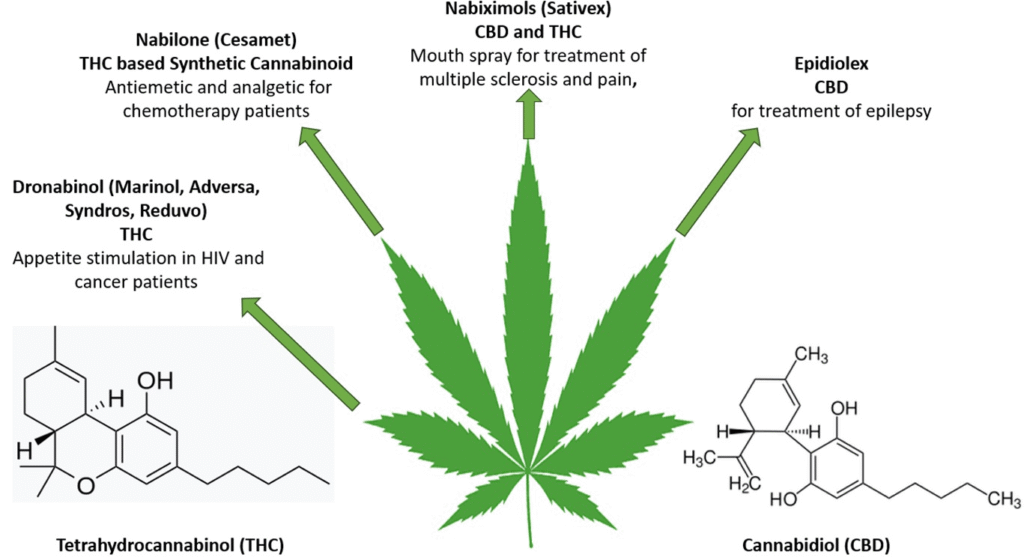If you're concerned about hair loss and wondering whether your cannabis use is contributing to it, you're not alone. Many individuals have reported noticing hair thinning or shedding while using marijuana. In this article, we will explore the potential link between weed and hair loss, considering both the possible risks and benefits. By the end …
If you’re concerned about hair loss and wondering whether your cannabis use is contributing to it, you’re not alone. Many individuals have reported noticing hair thinning or shedding while using marijuana.
In this article, we will explore the potential link between weed and hair loss, considering both the possible risks and benefits. By the end of this post, you’ll have a clearer understanding of how cannabis could impact your hair and what you can do to maintain healthy locks.

Understanding the Impact of Marijuana on Hair Health
How THC and CBD Interact with the Body
Cannabis contains two primary compounds that impact the body in different ways: THC (tetrahydrocannabinol) and CBD (cannabidiol). THC is responsible for the psychoactive effects of marijuana, while CBD is non-psychoactive and is being studied for its potential therapeutic benefits.
- THC: When you consume THC, it binds to cannabinoid receptors in the brain and throughout the body. This can potentially disrupt various systems, including those involved in hair growth. While THC does not directly cause hair loss, it can alter hormone levels, which may, in turn, impact hair health.
- CBD: In contrast, CBD is thought to have more positive effects on hair. Some research suggests that CBD may help promote hair growth by improving blood circulation to the scalp and reducing inflammation. However, more studies are needed to fully understand its impact on hair follicles.
Hormonal Effects and Hair Growth
Marijuana use can influence hormones, particularly testosterone and estrogen. For men, increased estrogen levels may contribute to hair thinning, while for women, hormonal imbalances can lead to conditions like alopecia or excessive shedding. These hormonal changes can disrupt the natural hair growth cycle, potentially leading to thinning or hair loss over time.
- Testosterone Imbalance: Excessive marijuana use may reduce testosterone levels, which can contribute to hair thinning.
- Estrogen Fluctuations: Elevated estrogen in men, resulting from cannabis consumption, may cause hair to thin.
Stress, Cortisol, and Hair Loss
Marijuana is often used to alleviate stress and anxiety. However, in some cases, chronic cannabis use can lead to elevated cortisol levels. Cortisol is the body’s primary stress hormone, and elevated levels of cortisol are linked to a condition called telogen effluvium. In this condition, hair prematurely enters the resting phase of the hair growth cycle, leading to increased shedding.
- Increased Cortisol: Cannabis use, particularly when used to cope with stress, may elevate cortisol levels, which can lead to hair loss.
- Telogen Effluvium: A stress-induced condition that can result in excessive shedding due to hormonal imbalances.
Scientific Studies on Cannabis and Hair Loss
Research Findings
Research on the direct link between cannabis use and hair loss is still ongoing. However, several studies suggest that the active compound in marijuana, THC, may negatively impact hair follicles, leading to a disruption in the hair growth cycle. On the other hand, CBD, when applied topically, has shown promising results in promoting hair growth.
- THC’s Impact: Some studies have indicated that THC may disrupt hair follicle development, leading to thinning hair or shedding.
- CBD’s Potential: A 2022 study found that topical application of CBD-infused oils led to an increase in hair count among participants.
Anecdotal Evidence
Many individuals who have used marijuana regularly report experiencing hair thinning or shedding. However, personal experiences vary, and while some individuals notice an increase in hair loss, others do not experience any significant effects. It’s important to note that the relationship between cannabis and hair loss can vary based on individual factors such as genetics, the frequency of use, and overall health.
- Variable Results: While some people may see hair loss due to marijuana use, others do not experience any significant changes.
- Other Contributing Factors: It’s also crucial to consider other factors that may contribute to hair loss, such as diet, stress, and underlying health conditions.
Factors That May Influence Cannabis-Related Hair Loss

Frequency and Method of Use
The impact of marijuana on hair health can depend on how frequently you use it and the method of consumption. Smoking cannabis, for example, may have a more significant effect on hair health than other methods like edibles or oils. Smoking introduces harmful chemicals into the body, which could exacerbate hair loss.
- Frequent Use: Regular use of marijuana may have a more noticeable impact on hair growth than occasional use.
- Smoking vs. Edibles: Smoking cannabis can expose your body to harmful toxins that may negatively affect your hair follicles, whereas consuming cannabis in other forms like edibles may reduce this risk.
Lifestyle and Nutritional Factors
Cannabis use can lead to changes in appetite and dietary habits, which may result in nutritional deficiencies. Proper nutrition plays a vital role in maintaining healthy hair, and a poor diet can exacerbate hair loss. Ensuring that you consume enough vitamins and minerals, particularly those essential for hair health like biotin, zinc, and iron, can help maintain hair growth.
- Nutritional Deficiencies: A diet lacking in essential vitamins and minerals can contribute to hair thinning, especially when cannabis consumption alters eating habits.
- Balanced Diet: Ensure you’re getting the nutrients your body and hair need to thrive.
Pre-existing Health Conditions
Individuals with pre-existing health conditions, such as hormonal imbalances or autoimmune disorders, may experience hair loss at a higher rate. If you already have conditions like alopecia or thyroid disorders, cannabis use could exacerbate hair shedding.
- Underlying Conditions: Autoimmune disorders, thyroid imbalances, or other health conditions can interact with cannabis use and potentially worsen hair loss.
- Genetic Factors: Some individuals may be genetically predisposed to hair loss, regardless of their cannabis use.
Managing Hair Health While Using Cannabis

Moderation and Consumption Methods
If you’re concerned about cannabis-related hair loss, moderating your use and opting for consumption methods that reduce exposure to harmful chemicals is essential. Switching to edibles, tinctures, or oils instead of smoking may mitigate some of the negative effects on your hair.
- Limit Use: Reducing the frequency of cannabis use may help prevent hair loss.
- Alternative Methods: Consider switching to edibles, oils, or other methods that are less damaging to your overall health and hair.
Nutritional Support
Ensuring you have a well-rounded diet rich in hair-friendly vitamins and minerals can counteract any negative effects of cannabis use on hair health. Adding supplements like biotin, zinc, and omega-3 fatty acids can support your hair’s natural growth cycle.
- Vitamins and Minerals: Include biotin, vitamin D, and zinc in your diet to promote healthy hair growth.
- Hair Supplements: Consider adding supplements that support hair health, especially if you’re experiencing cannabis-related hair thinning.
Consulting Healthcare Professionals
If you’re experiencing significant hair loss and suspect cannabis use may be the cause, it’s important to speak with a healthcare provider. A dermatologist or trichologist can help identify the cause of your hair loss and offer solutions, which may include adjusting your cannabis habits or pursuing other treatments.
- Professional Consultation: Seek medical advice if you notice excessive hair loss to determine the root cause.
- Hair Loss Treatments: Dermatologists can recommend various treatments, including medications or hair restoration options, to help combat hair thinning.
FAQs
Does smoking weed cause hair loss?
While research is still limited, some studies suggest that smoking cannabis may contribute to hair loss due to its effects on hormone levels and stress.
Can CBD promote hair growth?
Some studies suggest that CBD may help promote hair growth when applied topically. However, more research is needed to determine its efficacy.
How can I prevent hair loss related to cannabis use?
Moderating your cannabis use, maintaining a healthy diet, and consulting a healthcare professional can help reduce hair loss.
Conclusion
The relationship between weed and hair loss is complex and varies from person to person. While marijuana may contribute to hair loss in some individuals, it’s not a definitive cause for everyone. By moderating consumption, maintaining a healthy diet, and consulting with healthcare professionals, you can minimize potential risks and maintain healthy hair.
Ready To Take Your Next Step
If you’re noticing hair loss and think it might be linked to your cannabis use, schedule a consultation with Dr. Uzma Irfan, an ISHRS-certified surgeon, to explore possible causes and effective solutions tailored to your needs.






